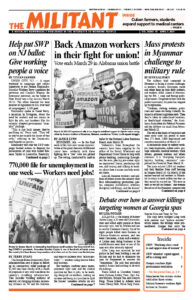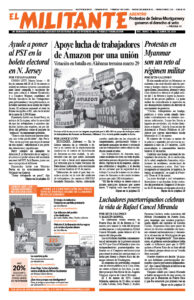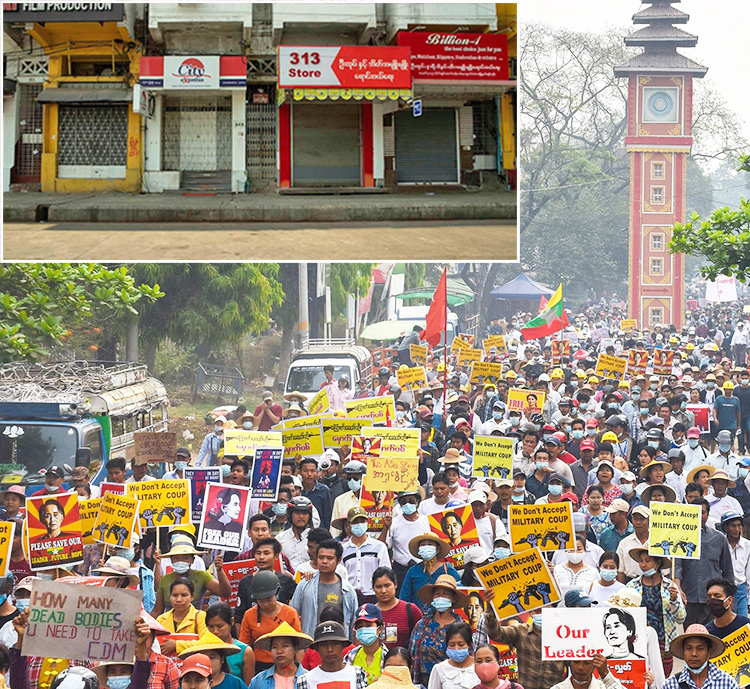The military high command in Myanmar is facing a serious challenge, as workers, farmers, fishermen, youth and others keep up their daily protests, and workers strike, aimed at overturning the Feb. 1 coup and freeing political prisoners. Desperate to beat back the protest movement, the junta has stepped up its repression.
“Civilians, striking workers, politicians and more are being violently detained in arbitrary nighttime raids. Then they’re taken to undisclosed locations, no family/legal visitation,” the Assistance Association for Political Prisoners told the Militant via email from Myanmar March 23.
The toll at the hands of the police and some army units has grown to more than 275 dead, 2,800 imprisoned and countless wounded as of March 23.
A nationwide strike by railway workers, bank employees, airline crews, garbage collectors, medical workers, truck drivers, garment workers and others continues. It is “disrupting transport, logistics, banking, commerce,” complained the Financial Times March 16.
The junta evicted 1,000 rail workers and their families from staff housing in Yangon March 10. On March 20 the regime warned rail workers in Mandalay to return to work within two days or they would be evicted too. “We were in tears as we left our homes,” one woman forced out of the Mandalay complex told the Irrawaddy news site. “Not because we are sad or scared of them. But because we are indignant at being bullied and abused.” She vowed, “We will fight the junta with the Civil Disobedience Movement until they fall.”
On Feb. 1, Gen. Min Aung Hlaing seized power and arrested Aung San Suu Kyi and other leaders of the National League for Democracy, which won the November 2020 election in a landslide. Suu Kyi has been the head of the government since 2016. Even though the 2008 Constitution guarantees that 25% of the seats in parliament are appointed by the military command, along with control of key ministries, the generals worried that Suu Kyi would now push for more power.
While Suu Kyi won support for lifting some restrictions on political rights, she also became the most prominent defender of the military in the face of worldwide condemnation of the expulsion of 700,000 Rohingya, a Muslim minority, from Rakhine state in 2017.
“I am not a very strong supporter of Suu Kyi,” Aung Moe Win told the Militant at a March 20 New York City demonstration in solidarity with the fight against the military rule. “It blew my mind when she defended what was happening to the Rohingya. But though we come from many different points of view we can come together to fight against the coup.”
Capitalist development in Myanmar
The garment industry has mushroomed in the last 10 years, with its bosses now employing as many as 700,000 workers. The majority of those factories belong to capitalist owners based in China, Singapore, Japan, United Kingdom, U.S., Germany, Holland and other countries. It’s similar for other industries. France-based Total and U.S.-based Chevron oil companies have substantial interests in Myanmar.
Beijing is one of the main suppliers of arms to the Myanmar military, and corporations based in China have entered into joint ventures with the generals and their cronies. Protesters are pressing the Chinese government to denounce the coup. In fact, prior to the coup, Beijing had developed friendly relations with both the generals and the National League for Democracy.
Like the regime in Beijing, other capitalist governments and corporations care little whether it’s the generals or the National League for Democracy that control the government. They want stability to continue to exploit workers in Myanmar, who make wages that are half what workers make in Vietnam and Cambodia.
And they worry about the impact of the movement protesting military rule on workers and farmers in the region, from Bangladesh to Thailand. Working people there also face attacks on political rights and are hit hard by the worldwide capitalist crisis.
Arson attack undermines strike
March 14 arson attacks on several dozen clothing factories in Yangon — mostly owned by Chinese businesses — were used as a pretext by the junta to declare martial law in six nearby working-class neighborhoods, including Hlaing Tharyar, that have been a stronghold of opposition to the coup. No one has taken credit for the attacks.
The junta went after residents with a vengeance. For several days it was almost impossible to get in or out of the Hlaing Tharyar neighborhood because of a military blockade. People trying to bring food to the besieged residents were arrested, as were volunteer medics treating those wounded in the assault.
Thousands demonstrated March 20 in the Hledan district of Yangon, just a couple miles from Hlaing Tharyar. They listened to speeches, chanted against the junta and sang protest songs for more than three hours. The resilience, determination and courage in the face of the crackdown is shown in daily protests in cities and towns and farming areas across the country.
The regime has relied heavily on army counterinsurgency units to attack unarmed demonstrators. Many of these units are notoriously brutal, including divisions that were involved in massacres of the Rohingya in the west and in fighting against ethnic minority guerrilla groups in other parts of the country.
Like all capitalist armies, Myanmar’s rank-and-file soldiers are largely drawn from among workers and farmers. Irrawaddy reported in 2009 that soldiers who are dismissed from the army due to illness or injuries are left on their own, with little or no benefits.
A small number of soldiers, appalled at the killing of unarmed protesters, have abandoned their posts.
James Khyne in Houston contributed to this article.


